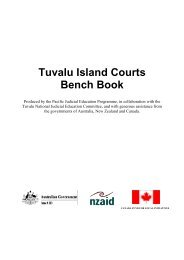Fiji Magistrates Bench Book - Federal Court of Australia
Fiji Magistrates Bench Book - Federal Court of Australia
Fiji Magistrates Bench Book - Federal Court of Australia
You also want an ePaper? Increase the reach of your titles
YUMPU automatically turns print PDFs into web optimized ePapers that Google loves.
7 Pleas<br />
7.1 Pleas Generally<br />
A defendant can either plead “guilty” or “not guilty” to a charge: s206(1) CPC.<br />
The defendant may, with leave <strong>of</strong> the <strong>Court</strong>, change a not guilty plea to guilty at any time.<br />
The defendant may also, with leave <strong>of</strong> the <strong>Court</strong>, change a guilty plea to not guilty at any time,<br />
but before sentencing.<br />
For pleas generally, see State v Isaia Saukova Crim App HAA <strong>of</strong> 2000L; LTA v Eroni Volavola<br />
Crim App 066 <strong>of</strong> 2002S; Michael Iro v Reg 12 FLR 104.<br />
7.2 Taking the Plea<br />
After you are sure that the defendant understands the charge, take a plea. See s206 CPC.<br />
Ask the defendant whether the charge is true or not. If the defendant says it is true:<br />
• ask the prosecution to read a brief summary <strong>of</strong> the facts;<br />
• tell the defendant to listen very carefully to this. Explain that he or she will be asked at<br />
the end whether the facts are true;<br />
• after the prosecution has read the facts, ask the defendant whether they are true or not.<br />
If the defendant admits the truth <strong>of</strong> the facts, this will suffice as a plea <strong>of</strong> guilty. You then:<br />
• record his or her admission as nearly as possible in the words used by him or her;<br />
• convict him or her; and<br />
• pass sentence or make an order against him or her (either immediately or at a later date).<br />
If the defendant admits the truth <strong>of</strong> the charge, but makes some remarks or comments, listen<br />
carefully because sometimes those remarks or comments indicate a possible defence. You need<br />
to be particularly alert to this if the defendant is unrepresented.<br />
If the defendant disputes any <strong>of</strong> the facts read out by the prosecution, consider whether the<br />
disputed facts are relevant to the elements <strong>of</strong> the <strong>of</strong>fence. Note that a plea <strong>of</strong> guilty is a plea to<br />
the elements <strong>of</strong> the charge, not necessarily acceptance <strong>of</strong> the Police summary <strong>of</strong> facts. If the<br />
facts in dispute are not relevant to the elements, enter a plea <strong>of</strong> guilty.<br />
If the disputed facts are relevant to any <strong>of</strong> the elements, or where any remarks or comments made<br />
by the defendant may amount to a defence, you must enter a plea <strong>of</strong> not guilty for the defendant.<br />
<strong>Fiji</strong> <strong>Magistrates</strong> <strong>Bench</strong> <strong>Book</strong> April 2004
















